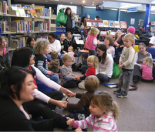So the kids are heading back to school- what about the under fives?
The “right” childcare option would have to be one of the most difficult choices for a parent. You are always looking for what is best for your child. Sometimes it is easy in the sense that cost dictates what is available to your family, but still, I would hazard a guess that a lot (but not all) parents would rather have the option of staying at home with their little ones.
Interestingly, I have been reading that in Denmark they have a full year of paid parental leave. After that year, the childcare is heavily subsidised so that of the 50% of under threes in state-subsidised childcare – 66% are not in nurseries (day care centres) but looked after in their own homes1. I’m not knocking the centres here in New Zealand, I am just wondering if we as a country, are ever going to get anywhere near that so that we can choose what works best for our families – rather than just have the cost dictate us?
Having spent 18+ years working with and observing families, and with the vast amounts of reading that I do with regards to children and parents, I have come to the conclusion that what works best for the whole family is if the Mum is happy. If the Mum is not happy, then the rest of the family can’t be as happy as they potentially could be. So, having made a broad statement like that, I would go on to say that if what would make a Mum happy is to use her brain in another way, to get into the workforce and all that it entails, then that would be the best option for that particular family. If a parent is trying desperately to “give happiness” to their child/partner from lack, then it is always a struggle, but if a parent is really fulfilled, feels that they are making a difference and achieving in a way that works for them, then they will be able to “give happiness” from abundance – and everyone benefits. (Of course work may not be “the thing” that makes a Mum or Dad happy).
So, the common childcare options are: A parent staying at home. A relative or friend looking after your child. A nanny/nanny share. Home based childcare. A form of day care. If one thing stands out in the studies, it is that one-on-one care is the most beneficial for under threes, if the carer is responsive and sensitive to the child’s needs. A couple of great books are Raising Boys, and also Raising Girls, Steve Biddulph. He can definitely enlighten you about your children and help you to understand their needs.
A parent staying at home is commonly thought of as the most preferable way to raise a child, but this is not always possible, so another idea could be a friend or family member that you trust implicitly. One of the down sides of this is that you will probably have less authority in terms of asking things to be done a particular way as sometimes family just “know better”, I hear about that a lot! However, it can be incredibly rewarding too and create a wonderful bond that lasts forever, and it would be a familiar environment for the child.
A Nanny is a more expensive option, but comes with some benefits. She will likely be able to take instruction and be happy to do things the way you like it as this is the nature of the role. You could expect a tidy house (kids things) and kitchen at the end of the day, a dishwasher that is able to be used, rather than full and forgotten to be turned on in the morning rush, she might have seen the washing machine had finished and had a chance to hang it out for you, maybe some family meal prep – if this is what you have negotiated with her. Each nanny is different and providing the expectations are set and met on both sides it can be a great working relationship. Your child would have good quality one on one care and his or her needs will be met as required. Conflicts that arise with other children whilst playing will be observed and guidance offered as and when necessary to teach your child the skills of effective communication. Activities will be based around your child’s interests and when your child is ill, you can still go to work. Click here for Kiwi Families’ overview on Nannies, the things to look for and the questions to ask yourself and them.
The Nanny share is where you can share the costs with another family, the children can be looked after in your home or the other family’s. The advantage of this is that it is cheaper than a nanny of your own, you can alternate weeks at each house to cover food costs evenly or make other arrangements to suit both parties. It would be sensible to find another local family for convenience.
Home based childcare is where you take your child to another person’s house, or it could be in your own home. They are monitored by a governing body and regular safety inspections are made to ensure the quality of the service being provided. They can have up to four children under six, with no more than two children under two years old. As much as possible, your child’s routine can be the same as at home. There is flexibility in the hours – they can be arranged to suit your working week. The educational activities will always be age appropriate for your child. Again, as with a nanny, conflicts could be dealt with as needed, perhaps with a small delay as there might be other children about with more pressing needs – but this could be the same as a stay at home parent with 4 kids running about, so not necessarily a negative.
Day care centres are a common option for many parents but it’s important that you choose a centre that encourages attachment and has consistent carers. One article I was reading from Psychology Today2 about how daycare affects a child’s behaviour states “The short answer is, daycare has a variety of measurable effects, many of them positive and some of them negative. And they hinge on the quality of the care, the type of care and the amount of time spent in it, pretty much as with parenting”. In particular, check whether the staff at the centre give guidance to help childcare resolve conflicts that naturally occur. Children will fall into a particular way of dealing with something, be it lashing out, becoming sullen, crying etc… whereas when given regular guidance a child will learn to communicate that they do not like something and that it is “not ok” for that behaviour in their little world. If you know this, you can make a concerted effort to encourage these skills at home and when socialising with your own friends and family.
Something to consider is the illness factor of daycare. When you introduce your child to an environment where there are lots of new viruses and bacteria, then your children are highly likely to get ill. Repeatedly. When your child is ill, has an upset stomach or anything that looks contagious, they are not welcome at the daycare centre. This is fair enough, but your child has probably caught it from there, so it might feel a little unfair… I know of one family who calculated the cost of their child’s two days a week at daycare (and the number of days he couldn’t go from illness) and found that it was actually cheaper to hire a nanny for those two days so that they could still go to work… and the funny thing is, in almost a year the child has only been ill once.
Which will take me on to my next point, but firstly, this is NOT to make people feel guilty. Some children find daycare stressful and this can lead to consistently high cortisol levels (stress hormone) that don’t allow the child’s immune system to have a normal healthy response to that exposure, hence a cough that doesn’t go away or recurring infections. If you find that your child is getting ill a lot at daycare, you might like to consider adding supplements to their diet to help support their immune system. Ask your pharmacist for advice about these. ‘The Concotion!’ as it is commonly referred to in my sister’s house really helps to boost my nephew’s immune system when he is under the weather. Obviously a healthy diet and lots of good quality sleep will keep your little ones at their best.
I have some other advice for those considering day care centres. I would recommend viewing several, and revisiting the ones you like the most at a different time of the day. Assuming the centre meets all of the necessary requirements, the key things that I would look for in a day care centre is firstly, The Staff. How do they interact, do they appear happy/content/satisfied/enthusiastic both at the beginning of the day and the end – is there an air of calm in the building? Are they able to communicate well? Next, the Children, are they happy/content/interactive, do they settle relatively quickly, are they supported when upset or left to fend for themselves? Of the children that you see when you are there, are they looking lost or upset without some support from an adult within a reasonable amount of time? Is there anything that makes you feel uncomfortable about the environment you are witnessing? If so, you could ask the person showing you around directly about it, speak to a manager/owner about the incident or move on to the next centre. I have seen some really super day care centres where the vibe is just there. These are the ones where as much as possible your child’s needs are met on an individual basis, the staff are attentive and caring and the environment nurturing – that’s what you’re looking for.
Childcare can be a tricky business. I would suggest that your gut reaction to a place where your child is going to spend a reasonable length of time is worth listening to. A choice has to be made that works for you, and the rest of your family. Once made, don’t feel guilty about it, but be open to reassess if it really is not working out. I would suggest a settling in period 4-8 weeks (obviously depending on the severity of reactions). Trust that the choice you make is what will make life work for the whole family in the end, because as a parent, you are doing the very best you can.
1http://www.guardian.co.uk/politics/2004/jul/08/research.earlyyearseducation
2Psychology today – it all depends on the quality of care – American based study – http://www.psychologytoday.com/articles/200704/daycare-raising-baby






